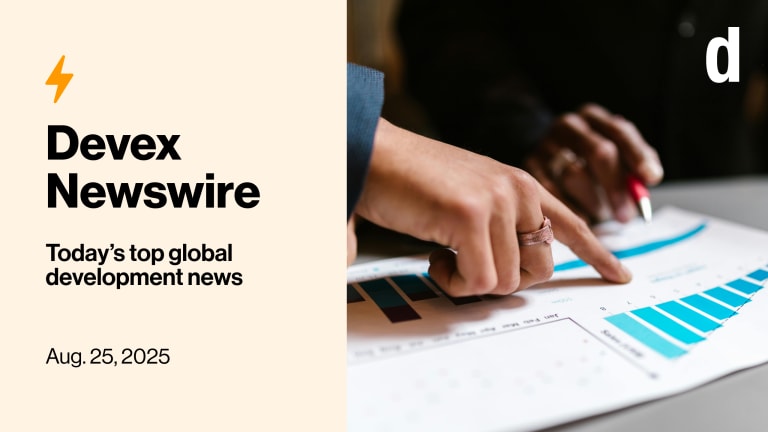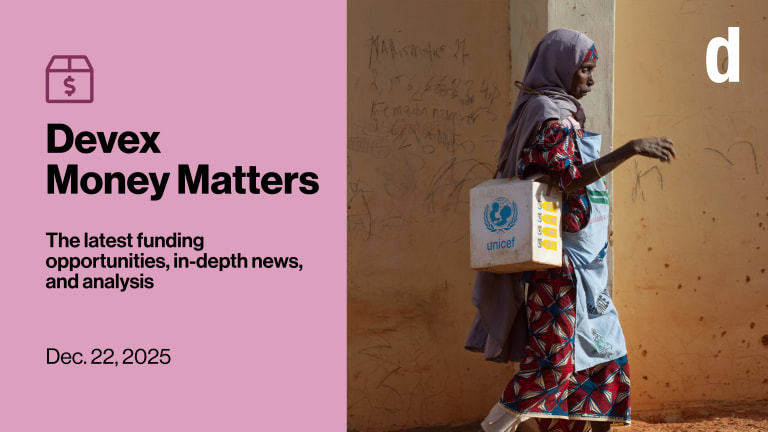
As the third International Conference on Financing for Development in Addis Ababa, Ethiopia, draws to a close, finding innovative and collaborative ways to tackle ever-growing levels of poverty with ever-shrinking resources remains a pressing need.
But innovation and collaboration on money matters is not just limited to the corridors of power. Across the globe, public and private organizations of all shapes and sizes are finding clever new ways to make their money do more, for them and ultimately for those in need.
The lessons from such experiments should be shared with everyone with an interest in humanitarian and development issues:
1. Think outside the ‘bank.’
Crowdfunding is becoming of increasing interest for humanitarian actors.
An example of this emerged from last year’s AidEx, through a chance meeting between Extremis Technology — a provider of emergency shelter solutions — and TECHO — a charity seeking to eradicate poverty in slums across Latin America and the Caribbean through community-based action.
The two organizations decided to pilot a project in the Dominican Republic to build shelter in a specific favela district. To finance it, Extremis have turned to Crowdcube, the world’s leading investment crowdfunding platform, which allows potential investors of all kinds to review the project, express their interest and join the journey.
At one level, crowdfunding provides sources of financing beyond traditional government grants or high-level funds (which can be burdensome and difficult to navigate). But in addition, it levels the playing field when it comes to the provision of aid. Donors feel more emotionally invested in the welfare and outcome of the project they’ve signed on to, while organizations can benefit from the immediate feedback they receive from donors and the visibility they gain for their work with new audiences.
2. Learn from each other.
Collaboration might be a buzzword when it comes to aid and development, but with good reason.
Private sector companies are increasingly looking to lend a sustainable hand in the form of their specific market expertise, as much as nongovernmental organizations are looking to the private sector for lessons on increasing efficiencies.
Organizations such as Ebury, a financial technology company specializing in currency exchange, point out that charities often lack the internal expertise and know-how to navigate what can be volatile currency exchange markets. Last year, the world’s top global charities lost $23.5 million on foreign exchange — that’s money that could have made a difference on the ground.
Foreign exchange can represent a huge part of an NGO's financing or banking costs. There are numerous ways to make savings here, but many smaller and midsize organizations are not getting the best deal. Here are 10 questions NGOs should ask to get the best deal from their banks or brokers.
Charities can also become more efficient by learning lessons from the private sector by acting more like businesses, according to Beverly Gwadera, head of business development (charities) at Ebury.
“If we can help charities to see themselves as businesses, in terms of the way they work to make money go further, they can be sure of making a greater impact in the field,” she said.
3. Try new things and be ready to adapt.
Pretty much everyone agrees that cash, as opposed to in-kind aid, is becoming the preferred alternative in humanitarian and development scenarios.
Cash offers recipients more flexibility to meet their specific needs. But it also empowers them to work toward long-term goals, by giving them more control over their welfare and moving away from a traditional donor-beneficiary relationship.
Of course, the question then becomes: How do we get the cash to those in need?
Mobile money and e-vouchers are two recent technological solutions that have emerged. The benefits of each have been debated by mobile operators and aid providers alike. When implemented thoughtfully, they can impact not only individual recipients, but whole communities.
For example, international postcrisis development organization Mercy Corps and Red Rose, an SME that works with innovative cash transfer products, have together been rolling out e-vouchers in Nigeria.
This not only gives shoppers in the marketplace of Gombe greater ease of access to cash and commodities, such as pulses or beans, it also allows local shopkeepers to serve more people and sell more, and it enables Mercy Corps to monitor and adjust distribution problems in real time. In turn, this pumps money and economic self-sufficiency into communities suffering from insecurity, conflict and disruption.
As all these examples demonstrate, almost every player involved in the delivery of aid is starting to make the most of new services or solutions that help them stretch every penny a little further. What we need now is to make sure such examples become the norm, rather than the exception.
Devex is in Addis to give you the inside track on #Fin4Dev. Check out our running blog, and follow @Devex, @richard_devex and @AlterIgoe to get the latest news and developments from #FFD3.








